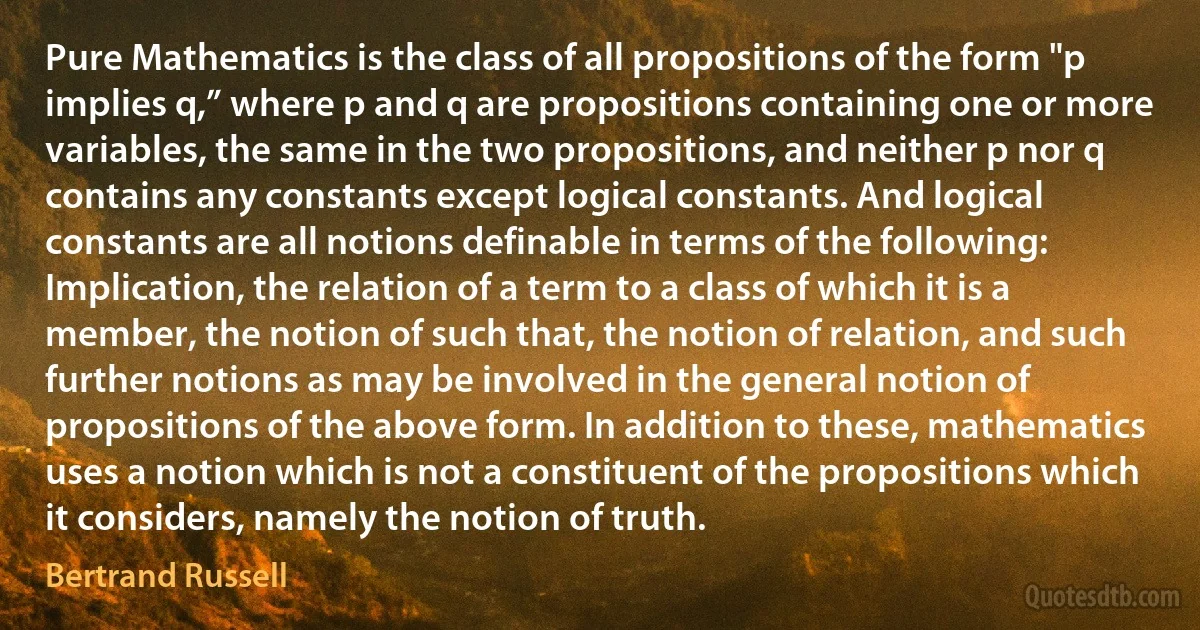Constituent Quotes
With respect to the use of this sparkling coloured material [butterfly wings, around 1955] – the constituent parts of which remain indistinguishable – with the aim of producing a very vivid effect of scintillation, I realised that, for me, this responds to needs of the same order as those that formerly led me, in many drawings and paintings, to organize my lines and patches of colour so that the objects represented would meld into everything around them, so that the result would be a sort of continuous, universal soup with an intensive flavour of life.

Jean Dubuffet
Let us take a patriot, where we can meet him; and, that we may not flatter ourselves by false appearances, distinguish those marks which are certain, from those which may deceive; for a man may have the external appearance of a patriot, without the constituent qualities; as false coins have often lustre, though they want weight.

Samuel Johnson
My theory has been to discover the modern synthesis by methods based upon science, methods based upon the theory of colors discovered by M. Chevreul, in conformity with the experiments of Maxwell and the measurements of N. 0. Rood; to substitute the optical mingling for the mingling of pigments; in other words, the decomposition of all the colors into their constituent elements; because the optical mingling excites much more intense luminosity than the mingling of pigments. As for the execution, we regard it as nothing; it is at any rate only unimportant, art having nothing to do with it. According to us, the sole originality consists in the character of the drawing and the vision individual to each artist.

Camille Pissarro
Apart from life and thought, there is no reason to regard one form of material distribution as in any respect superior to another. A solar system may be more interesting than its parent nebula; it may be more beautiful. But if there be none to unravel its intricacies or admire its splendours, in what respect is it better? Its constituent atoms are more definitely grouped, the groups move in assignable orbits; but why should the process by which these results have been achieved be regarded as other than one of purposeless change super-induced upon meaningless uniformity?

Arthur Balfour
Parliament is the centre of the British Empire. It is the responsibility of the members of Parliament, to whatever party they belong, to see that the tradition which has insensibly grown up, which is not a product of this or that constitution-monger, but which is the result of the unthought-out efforts for the public good of the various constituent individuals who from generation to generation, either in this House or in the other, had the conduct of public affairs is continued. It is their action which has made Great Britain what it is, and has founded all over the world institutions modelled upon ours and showing that, whether the British Constitution be or be not the best Constitution in the world for all kinds and sorts of men, it is undoubtedly the best Constitution for people of British origin, British tradition, British hopes, and British ideals. That is why I am consoled by the gradual rising of new generations as old generations vanish.

Arthur Balfour
A famous thorny issue in philosophy is the so-called infinite regress problem. For example, if we say that the properties of a diamond can be explained by the properties and arrangements of its carbon atoms, that the properties of a carbon atom can be explained by the properties and arrangements of its protons, neutrons and electrons, that the properties of a proton can be explained by the properties and arrangements of its quarks, and so on, then it seems that we're doomed to go on forever trying to explain the properties of the constituent parts. The Mathematical Universe Hypothesis offers a radical solution to this problem: at the bottom level, reality is a mathematical structure, so its parts have no intrinsic properties at all!

Max Tegmark
One of the things that 'queer' can refer to: the open mesh of possibilities, gaps, overlaps, dissonances and resonances, lapses and excesses of meaning when the constituent elements of anyone's gender, of anyone's sexuality aren't made (or can't be made) to signify monolithically.

Eve Kosofsky Sedgwick
The field of the finite is all that we can see, hear, touch, remember, and describe. This field is basically that which is manifest, or tangible. The essential quality of the infinite, by contrast, is its subtlety, its intangibility. This quality is conveyed in the word spirit, whose root meaning is "wind, or breath." This suggests an invisible but pervasive energy, to which the manifest world of the finite responds. This energy, or spirit, infuses all living beings, and without it any organism must fall apart into its constituent elements. That which is truly alive in the living being is this energy of spirit, and this is never born and never dies.

David Bohm
It is admitted that the power of taxing the people and their property is essential to the very existence of Government, and may be legitimately exercised on the objects to which it is applicable, to the utmost extent to which the Government may choose to carry it. The only security against the abuse of this power is found in the structure of the Government itself. In imposing a tax, the legislature acts upon its constituents. This is, in general, a sufficient security against erroneous and oppressive taxation. The people of a State, therefore, give to their Government a right of taxing themselves and their property, and as the exigencies of Government cannot be limited, they prescribe no limits to the exercise of this right, resting confidently on the interest of the legislator and on the influence of the constituent over their representative to guard them against its abuse.

John Marshall
Leninism is warlike from head to foot. War is impossible without cunning, without subterfuge. without deception of the enemy. Victorious war cunning is a constituent element of Leninist politics. But at the same time, Leninism is supreme revolutionary honesty toward the party and the working class. It admits of no fiction, no bubble-blowing, no pseudo-grandeur.

Leon Trotsky
The entire recent history of biology shows that we are, to a remarkable degree, the results of the interactions of an extremely complex array of molecules; and the aspect of biology that was once considered its holy of holies, the nature of the genetic material, has now been fundamentally understood in terms of the chemistry of its constituent nucleic acids, DNA and RNA, and their operational agents, the proteins.

Carl Sagan
A pure elastic fluid is one the constituent particles of which are all alike, or in no way distinguishable. Steam, or aqueous vapour, hydrogenous gas, oxygenous gas... and several others are of this kind. ...Whatever ...may be the shape or figure of the solid atom abstractedly, when surrounded by such an atmosphere it must be globular; but as all the globules in any small given volume are subject to the same pressure, they must be equal in bulk, and will therefore be arranged in horizontal strata, like a pile of shot.

John Dalton
"The Sanskrit shall be our " Deva Bhasha)" our sacred language and the "Sanskrit Nishtha" Hindi, the Hindi which is derived from Sanskrit and draws its nourishment from the latter, is our ' 'mr' ' (Rashtra Bhasha) 12 [f.12] our current national language--besides being the richest and the most cultured of the ancient languages of the world, to us Hindus the Sanskrit is the holiest tongue of tongues. Our scriptures, history, philosophy and culture have their roots so deeply imbedded in the Sanskrit literature that it forms veritably the brain of our Race. Mother of the majority of our mother tongues, she has suckled the rest of them at her breast. All Hindu languages current today whether derived from Sanskrit or grafted on to it can only grow and flourish on the sap of life they imbibe from Sanskrit. The Sanskrit language therefore must ever be an indispensable constituent of the classical course for Hindu youths.

Vinayak Damodar Savarkar



